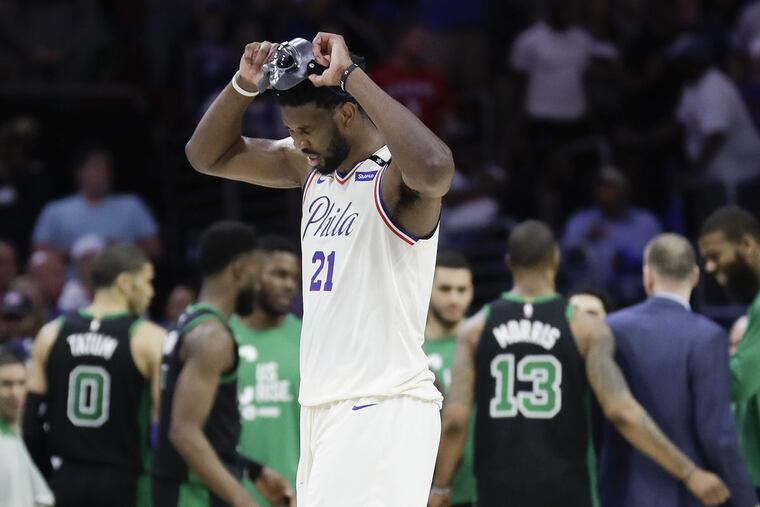From Jayson Tatum to Brad Stevens' coaching, an inconvenient loss for Sixers on many levels | David Murphy
For an organization on the rise, the Sixers lost Game 3 in the worst possible way.

The arena was quiet now, the seating bowl empty save for a sparse procession of janitors and operations staffers shuffling through the aisles. A man in a black shirt bent over and retrieved an empty soda cup from underneath a seat. Another pushed a large plastic bin toward the tunnel, its load of garbage bags obscuring his vision. But it was a third man whose toil offered the tidiest summation of that which had unfolded during the three or so hours that the building was packed. A broom in his hands, a trail of shredded paper at his feet, he swept the confetti toward the base of the stands, where it settled into a snowdrift like a pile of broken dreams.
A half an hour earlier, out in the corridor that encircles the court at the Wells Fargo Center, Brett Brown emerged from the 76ers locker room wearing a gray suit and reading glasses and a grim expression. He climbed into a golf cart manned by an organizational staffer who was charged with whisking him to his postgame news conference. Once he arrived, he climbed behind the microphone and spent 10 minutes attempting to find a positive prism through which to view the calamity that he had just witnessed. It was an arduous endeavor. Not only did his Sixers find themselves in situation that had ended the seasons of all 129 NBA teams who'd faced it before – down three games to none in a best-of-seven series – they got themselves there in a fashion so excruciating you have to wonder how far into the future the aftershock will ripple.
The final score said Celtics 101, Sixers 98, but this was much more than a loss. It might not have been a referendum, but it was the kind of thing that the general public often interprets as such. The Sixers were outplayed. Their head coach was outcoached. And their general manager was once again forced to confront the likely reality that he had been outmaneuvered and outscouted.
None of that should diminish what all three entities managed to accomplish in a season that is now all but over. There is a very real possibility that what we have witnessed over the last week has been nothing more than the better, more experienced team doing better, more experienced things. The Sixers won 52 games and then won a playoff series and then had a higher-seeded team on the ropes in two of three games. There is plenty of credit to be distributed: to the players and to their bosses and, most definitely, to a coaching staff that entered the day having guided them through 89 games of exceeded expectations.
But man, was game No. 90 a doozy. Actually, let's call it what it was: an embarrassment, albeit in the strictest sense of the word, with no value judgment implied. These are men who pride themselves on success, and in a game that was repeatedly theirs for the taking, the Sixers repeatedly failed.
They failed to stop Jayson Tatum, the rookie on whom they passed. He scored 24 points on 11-of-17 shooting and hit three big buckets late in the fourth quarter and overtime. Markelle Fultz, the player whom Bryan Colangelo traded an extra top-5 pick to draft, did not play.
They failed to stop Brad Stevens' inbounds plays. One of them resulted in a game-tying shot, a sideline lob to Jaylen Brown with 25.4 seconds left in regulation. Another resulted in the game-winner, a side-out that saw Al Horford seal off Robert Covington after Joel Embiid switched off a screen and ended up on the perimeter, the ensuing layup giving the Celtics a 99-98 lead with 8.4 seconds left in overtime.
"We were supposed to switch everything, and we did," Embiid said. "Horford just got good position, and he ended up scoring."
On the other end of the court, they repeatedly failed to execute in the highest of high-leverage situations. There was J.J. Redick throwing a pass as Ben Simmons turned his back, gift-wrapping the Celtics a go-ahead fastbreak layup with 4.7 seconds remaining in regulation. There was Embiid turning the ball over to Terry Rozier with 42.5 seconds remaining in overtime. There was Simmons attempting and missing a putback layup with 17 seconds remaining in overtime and the Sixers up by one and the shot clock off, a disastrous misread of a situation that called for kicking the ball back out. Even the operations staff got in on the act, Marco Belinelli's buzzer-beating jumper at the end of regulation setting off an explosion of confetti by someone who thought the game-tying two-pointer was actually a game-winning three.
The result was a loss that not only left the Sixers one game away from the offseason but a performance that will only further a lot of narratives that have percolated all season. The only one that is entirely fair says that the Sixers entered this postseason a little too big for their britches. The best antidote for most of what went down in Game 3 is more NBA experience. There is also some validity to the Fultz-Tatum angle, although nothing about what happened changed what was already true. As for the coaching, well, there are far too many variables for Brown vs. Stevens to be a zero sum thing. Stevens' performance this series should not diminish the performance Brown got from his team this season.
There's a chance the Sixers' headshaking loss wasn't anything more than a case of one of basketball's greatest in-game tacticians leading a well-rounded rotation to a 50/50 victory over a well-coached but imperfectly-staffed team that has spent too little time playing together. No, Game 3 may not have been a bellwether. But it was most definitely inconvenient.